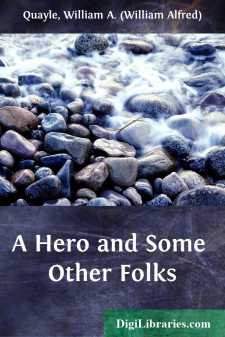Categories
- Antiques & Collectibles 13
- Architecture 36
- Art 48
- Bibles 22
- Biography & Autobiography 813
- Body, Mind & Spirit 142
- Business & Economics 28
- Children's Books 14
- Children's Fiction 11
- Computers 4
- Cooking 94
- Crafts & Hobbies 4
- Drama 346
- Education 46
- Family & Relationships 57
- Fiction 11829
- Games 19
- Gardening 17
- Health & Fitness 34
- History 1377
- House & Home 1
- Humor 147
- Juvenile Fiction 1873
- Juvenile Nonfiction 202
- Language Arts & Disciplines 88
- Law 16
- Literary Collections 686
- Literary Criticism 179
- Mathematics 13
- Medical 41
- Music 40
- Nature 179
- Non-Classifiable 1768
- Performing Arts 7
- Periodicals 1453
- Philosophy 64
- Photography 2
- Poetry 896
- Political Science 203
- Psychology 42
- Reference 154
- Religion 513
- Science 126
- Self-Help 84
- Social Science 81
- Sports & Recreation 34
- Study Aids 3
- Technology & Engineering 59
- Transportation 23
- Travel 463
- True Crime 29
A Hero and Some Other Folks
Categories:
Description:
Excerpt
Jean Valjean
The hero is not a luxury, but a necessity. We can no more do without him than we can do without the sky. Every best man and woman is at heart a hero-worshiper. Emerson acutely remarks that all men admire Napoleon because he was themselves in possibility. They were in miniature what he was developed. For a like though nobler reason, all men love heroes. They are ourselves grown tall, puissant, victorious, and sprung into nobility, worth, service. The hero electrifies the world; he is the lightning of the soul, illuminating our sky, clarifying the air, making it thereby salubrious and delightful. What any elect spirit did, inures to the credit of us all. A fragment of Lowell's clarion verse may stand for the biography of heroism:
"When a deed is done for Freedom, through the broad
earth's aching breast
Runs a thrill of joy prophetic, trembling on from east
to west;
And the slave, where'er he cowers, feels the soul within
him climb
To the awful verge of manhood, as the energy sublime
Of a century bursts full-blossomed on the thorny stem
of Time;"
such being the undeniable result and history of any heroic service.
But the world's hero has changed. The old hero was Ulysses, or Achilles, or Aeneas. The hero of Greek literature is Ulysses, as Aeneas is in Latin literature. But to our modern thought these heroes miss of being heroic. We have outgrown them as we have outgrown dolls and marbles. To be frank, we do not admire Aeneas nor Ulysses. Aeneas wept too often and too copiously. He impresses us as a big cry-baby. Of this trinity of classic heroes—Ulysses, Aeneas, and Achilles—Ulysses is least obnoxious. This statement is cold and unsatisfactory, and apparently unappreciative, but it is candid and just. Lodge, in his "Some Accepted Heroes," has done service in rubbing the gilding from Achilles, and showing that he was gaudy and cheap. We thought the image was gold, which was, in fact, thin gilt. Achilles sulks in his tent, while Greek armies are thrown back defeated from the Trojan gates. In nothing is he admirable save that, when his pouting fit is over and when he rushes into the battle, he has might, and overbears the force opposing him as a wave does some petty obstacle. But no higher quality shines in his conquest. He is vain, brutal, and impervious to high motive. In Aeneas one can find little attractive save his filial regard. He bears Anchises on his shoulders from toppling Troy; but his wanderings constitute an Odyssey of commonplaces, or chance, or meanness. No one can doubt Virgil meant to create a hero of commanding proportions, though we, looking at him from this far remove, find him uninteresting, unheroic, and vulgar; and why the goddess should put herself out to allay tempests in his behalf, or why hostile deities should be disturbed to tumble seas into turbulence for such a voyager, is a query. He merits neither their wrath nor their courtesy. I confess to liking heroes of the old Norse mythology better....


